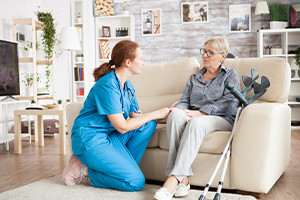Anyone at any stage of life - including those with learning disabilities, mental health issues, sensory impairment or physical disabilities - could require domiciliary care. Are you passionate about providing care for people in their homes? As a domiciliary care worker, you are responsible for supporting individuals and assisting them with their daily household chores, personal care and any other activity that allows them to maintain their independence and quality of life. In this course, we train you in homecare and examine the domiciliary care minimum standards issued by the United Kingdom’s Department of Health. We then compare ‘shared lives’ carers and ‘personal assistants’.
The course then explores the UK’s health and safety guidelines pertaining to domiciliary care and explains how to identify individuals who are at risk. Accidents may occur during work activities, resulting in injuries or even death, and we lay out the procedures to follow in order to report the incident. We will show you how to report serious workplace accidents, occupational diseases and specified dangerous occurrences (or 'near misses') following ‘Reporting of Injuries, Diseases and Dangerous Occurrences Regulations’ (RIDDOR) standards. We outline when and how to make a RIDDOR report and how to determine if an accident that led to a death or injury is work-related. You will study the types of reportable injuries, how to prioritise risk control measures and what is considered an ‘infectious waste’.
Understanding the nature of diseases alerts us to their presence and can help us control their spread. We examine Methicillin-Resistant Staphylococcus Aureus (MRSA) and blood-borne viruses and how they are spread. You will then be taught how to employ hand hygiene techniques and prevent the spread of infection. We outline the ‘National Early Warning Score’ (NEWS), a tool developed by the Royal College of Physicians used to improve the detection and response to clinical deterioration in adult patients. We demonstrate how to carry out cardiopulmonary resuscitation (CPR). Finally, we discuss medication management and administration, how to communicate effectively, the Mental Capacity Act and the ‘Dementia and the Deprivation of Liberty Safeguards (DoLS). No prior knowledge is necessary to take this course. These skills provided in this training course can be used to protect the wellbeing and dignity of infirm loved ones and caregiving offers a rewarding career to those with compassion.
What You Will Learn In This Free Course
View All Learning Outcomes View Less All Alison courses are free to enrol, study, and complete. To successfully complete this Certificate course and become an Alison Graduate, you need to achieve 80% or higher in each course assessment.
Once you have completed this Certificate course, you have the option to acquire an official Certificate, which is a great way to share your achievement with the world.
Your Alison certificate is:
- Ideal for sharing with potential employers.
- Great for your CV, professional social media profiles, and job applications.
- An indication of your commitment to continuously learn, upskill, and achieve high results.
- An incentive for you to continue empowering yourself through lifelong learning.
Alison offers 2 types of Certificate for completed Certificate courses:
Digital Certificate: a downloadable Certificate in PDF format immediately available to you when you complete your purchase. Physical Certificate: a physical version of your officially branded and security-marked Certificate All Certificate are available to purchase through the Alison Shop. For more information on purchasing Alison Certificate, please visit our FAQs. If you decide not to purchase your Alison Certificate, you can still demonstrate your achievement by sharing your Learner Record or Learner Achievement Verification, both of which are accessible from your Account Settings.













 Avg. Hours
Avg. Hours  CPD Accredited
CPD Accredited 


 Total XP:
Total XP: 
 Knowledge & Skills You Will Learn
Knowledge & Skills You Will Learn 







